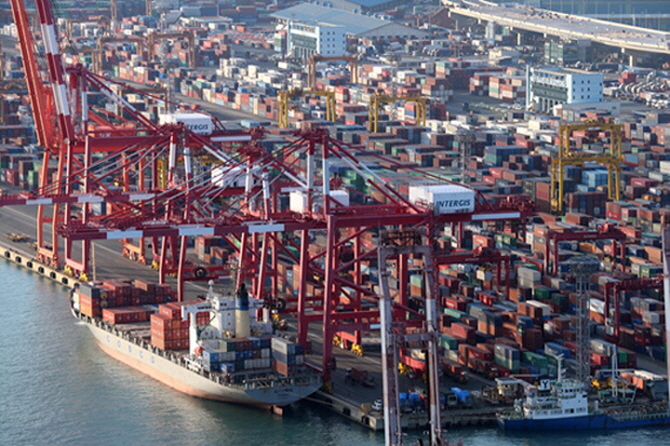The KRW has depreciated by 2% against the USD and appreciated by 0.9% against CNY. Whether the CNY devaluation will hurt total Korean exports like the JPY depreciation did is uncertain, because China is Korea's largest export destination (25.4% of total Korean exports in 2014) and 73% of Korean exports to China are intermediate goods.
Therefore, an improvement in Chinese exports resulting from weaker CNY and the government's export support measures should also lead to an increase in Korean exports. The demand for Korean final goods in China may decrease in the short term but the improvement in the Chinese economy resulting from the rebound in its exports should ultimately increase China's demand for Korean final goods.
In addition, the JPY has remained resilient amid the CNY devaluation shock, the rise in JPY/KRW is also welcome news for Korean exports, which have great similarity to Japanese exports. However, the competition between Korean and Chinese exports has been increasing over the years.
"The CNY devaluation would merely intensify the competition between Korean and Chinese final goods in the US and European markets. Considering the still weak export performance and policymakers' preference for weaker KRW, we see further upside for USD/KRW", says Credit Agricole.
According to the Korea International Trade Association, the similarity between Korean and Chinese exports to the US, Korea's second largest export destination (12.2% of totalexports), increased from 0.340 in 2010 to 0.346 in 2014. Given low confidence in the global recovery, Chinese exports may fail to rebound meaningfully.
"However, the extent of depreciation should be limited by Korea's large current account surplus, which is expected to be 7% of GDP this year. Another BoK rate cut is not expected this year but if the positive effect of CNY devaluation on Korean exports does not become apparent and the expectations for a BoJ QQE expansion grow, the likelihood of USD/KRW rising above 1200 and extra BoK easing will increase", added Credit Agricole.
CNY weakening to effect Korean exports?

Port of SouthKorea
Thursday, August 20, 2015 4:08 AM UTC
Editor's Picks
- Market Data
Most Popular



 Best Gold Stocks to Buy Now: AABB, GOLD, GDX
Best Gold Stocks to Buy Now: AABB, GOLD, GDX  FxWirePro: Daily Commodity Tracker - 21st March, 2022
FxWirePro: Daily Commodity Tracker - 21st March, 2022  Gold Prices Fall Amid Rate Jitters; Copper Steady as China Stimulus Eyed
Gold Prices Fall Amid Rate Jitters; Copper Steady as China Stimulus Eyed 






























